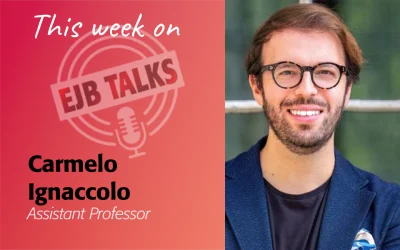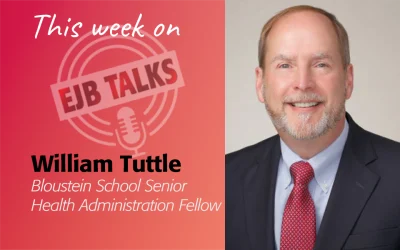On this episode of EJBTalks Stuart Shapiro welcomes Billy Terry, Executive Director of Bloustein’s National Transit Institute (NTI), the federally funded training arm for the transit industry’s extensive back-office operations. Billy talks about how he started in the transit world and his path to his role at Rutgers. The two discuss NTI’s mission to educate the administrative workforce within the multitudes of transit agencies across the nation. Billy gives an overview of the broad catalog of training that NTI offers on adhering to regulations and guidelines and the growing focus on managing and cultivating the diverse workforce. He also discusses the new and exciting focus on training current employees to successfully transition to much-needed supervisory roles. Tune in to hear about all this and more!
Stuart Shapiro
Welcome to EJB Talks. I’m Stuart Shapiro, the Interim Dean of the Bloustein School, and the purpose of this podcast is to highlight the work my colleagues and our alumni in the fields of policy, planning, and health are doing to make the world the country and New Jersey a better place.
Today, we’re very happy to welcome Billy Terry, Executive Director of the National Transit Institute, to the podcast continuing our season-long theme of highlighting the Bloustein School research centers. Welcome, Billy,
Billy Terry
Thank you so much, Stuart. I appreciate you having me, my friend.
Stuart Shapiro
We’re very glad to have you. So let’s do as we have with all of these, start with a description of what NTI is for those that may not know and what its mission is and how you got involved with it.
Billy Terry
Well, Stuart NTI, the National Transit Institute, serves as the training arm, the federally funded training arm for the transit industry. I think for many of us regardless of where we live–big town, small town, north, west, east south–whenever we think of public transportation, we think of the most overt part of public transportation, we see buses, we see trains. The reality is there is an extensive back-office operation, so to speak. And so there are transit agencies that require planners, engineers, marketing, and law enforcement, and the National Transit Institute provides training predominantly to the staff of transit agencies across the country.
When you are a federally funded transit agency, there are very specific rules on procurement of disadvantaged business enterprises, and other administrative operational procedures that you must adhere to, and NTI provides training to help those transit agencies adhere to those rules, and regulations, and guidelines.
Stuart Shapiro
Gotcha. And how did you get involved with all this?
Billy Terry
Well, you know, I have been in the transit industry for a number of years, but I am a recovering lobbyist Stuart, we’ve had some conversations about that… (((laughing)))
Stuart Shapiro
There’s no shame in being a lobbyist, Billy. (((laughing)))
Billy Terry
Absolutely, absolutely. I served as a lobbyist for WMATA, the transit agency in DC, and was their federal lobbyist for a number of years. And I spent a number of years on the government affairs team for the American Public Transportation Association, which is the association for the industry, if you will. I had the fortune of meeting Paul Larrousse, who was the previous director for NTI for almost 18 years. Paul, not just for me, but for many was a mentor. And Paul came to me and said, “Hey, Billy, I’m thinking about retiring soon, what would you think about joining me at NTI?” And I said, Paul, I’m a stinking lobbyist I don’t know anything about training. And, and he said, “Well, Billy, you’ve lobbied virtually every issue related to public transportation”. He said, “I could find a CEO somewhere to come and do this, but I think he would have a unique perspective.”
So we went back and forth and finally I hopped on Amtrak, came up here to New Brunswick, interviewed with Paul, interviewed with Bob Nolan, and they said, “We think you will be a good fit.” And I came and joined NTI in January of 2018, as the Associate Director, with the intention of Paul retiring next year, and me assuming that director role. And as many of you know, Paul left us far too soon, in November of 2018, which accelerated my transition to Executive Director. But to be honest with you, Stuart, it was really Paul’s vision of what he believed that I could contribute to the National Transit Institute and the industry from my government affairs background that brought me here.
Stuart Shapiro
Gotcha. We do miss Paul a great deal here at the Bloustein School
Billy Terry
Absolutely.
Stuart Shapiro
I want to talk to you about the DC Metro now that I know you have a Washington connection. We’ll hold off on that because that’s probably of more interest to you and me then it is to the audience. (((laughing)))
Billy Terry
Absolutely. (((laughing)))
Stuart Shapiro
What kind of … you’re different than a lot of our centers in that you’re very training focused. So let me ask you what kind of training our clientele need. You touched on it a little bit in talking about procurement and a few other things. What is sort of the big, most popular things that you guys offer to transit agencies?
Billy Terry
Absolutely. And training can be a nebulous verb or noun how I guess you look at it. But when you are a federal grantee, regardless of what industry again, there are rules, regulations, and guidelines, you must adhere to doing whatever you do. So the training for us, let’s take procurement, for example, there are certain rules as it pertains to putting out bids receiving bids. Even in operations, there are certain Americans with Disabilities Act parameters you must adhere to. Title six, for example, when you print schedules or you display schedules. So there are just a number of different rules, regulations, and guidelines you must adhere to in operational and administrative regards.
If you want to move a bus stop or change service, there are certain public announcement rules that you have to apply. We have of course called Public Involvement in Transportation Decision Making. So again… and I will say, Stuart, we do most of our training that’s focused on the white-collar administrative functions. We don’t do much of our training relating to operators or mechanics, maybe years down the road, but much of our training is focused on the administrative aspect of running a transit agency.
Stuart Shapiro
Gotcha. Yeah, you don’t know that there’s this whole world behind everything.
Billy Terry
There is a very, very extensive world. And as a matter of fact, one of the things that the industry is on a major marketing campaign is, hey, if you are a marketing major, if you are an engineer if you are in law enforcement, and you’ve never thought about public transportation as a career there…, If you’re an expert in electronics, if you are an architect. There are very few occupations that I can think of where there probably is not a role for you in public transportation.
Stuart Shapiro
Yeah, that’s fascinating. Most of us would never have imagined that. Now I know, the way you do things has had to change dramatically, because of COVID-19, and what’s going on in the past few years. Can you talk a little bit about how that’s changed life at NTI?
Billy Terry
Absolutely. Pre-COVID, most, I would say 98 to 99% of our training, was on-site instructor-led training. So let’s say Metro in Minneapolis, we would agree with them to host our procurement 1 course. We would advertise it. People from around the country would fly to Minneapolis and would stay in a hotel adjacent to them, they had a conference room, and we would do 1,2,3,4 day, on-site, classroom style training. Now, post-COVID, we’ve instantaneously had to transition all of our training and educational events to virtual. We use Zoom as our platform. And that has been a major major lift. Simple things from when we did it on site. You got this nice bulky binder that you use as an asset, you write notes, and now we have to send it electronically. Do you have a printer at home to print those 200 pages out? Attendance; you used to sign your initials next to your name on-site? Now we have to take virtual attendance.
And I think there’s been some Yin and some Yang to it Stuart. If you were a small agency, and you didn’t have much of a travel budget for training, it was challenging for you to send your employees to NTI training across the country, if we weren’t doing it in proximity to you. Doing it virtually, we’ve been able to incorporate just a significantly increased number of people who previously couldn’t participate in their training now that we’re doing it virtually. But I think most people would agree that there’s nothing like doing it on-site, right? Probably 50% of our people who take our courses say that networking is every bit as much as important as actually the course itself. And you don’t have that networking element when you’re taking a course virtually. So to your point, we’ve instantaneously had to switch to a virtual training delivery platform. Once we do go back on-site and $64,000 question I do not know when, but we will continue to have a virtual course portfolio because the demand has just been too great for those virtual offerings.
Stuart Shapiro
Yeah, I mean, that’s something we think about as an educational institution is well, you know, what’s going to change and what’s gonna go back to the way it was before. What are the most important things you’ve learned from having to make this switch that was forced upon you. I mean, I had never taught virtually before March of 2020. And I’m thrilled to be back in the classroom. But I wouldn’t say I haven’t learned a lot from the year and a half of teaching online and I’m sure the same is true in NTI.
Billy Terry
Absolutely. I think you know, in any one of our courses, we are constantly trying to put 16 ounces in a 12-ounce jar. I mean we could do a semester-long graduate course on any one of our topics. And even when we’re doing it on-site, we were trying to do the highlights over 1-4 days. And so we’ve had to truncate it even more so for our virtual courses. We concluded that about four hours a day for four consecutive days is probably the max, virtual educational absorption that an individual can take. This means we’ve had to truncate much of the content in our courses to offer them virtually.
So I think we’ve learned how to be more efficient. We’ve, in some instances, we’ve taken the highlights of the highlights if that makes any sense.
Stuart Shapiro
Yeah.
Billy Terry
And so now, when we move back, ultimately, when we move back to onsite courses, we’re finding that there will be a distinction between what we taught virtually and what we’re able to teach on-site. And we have to give an account for that, because the individual who took procurement one virtually, is getting a very different product than the individual who took procurement one on site. And so we’re going to have to figure out how we, how we account for that. But efficiency is the word of the day, when I think about what we’ve learned, teaching virtually, and administering virtually also.
Yeah, I think that’s exactly right. And sort of figuring out like what you can do in this hybrid world where some people get it, virtually, and some people get it in person, and what’s the equivalence and things like that? Absolutely. Any new courses that you’ve taught because of the pandemic?
I wouldn’t say because of the pandemic. But there were courses that we had in the books, and we were looking forward to unleashing them. And then the pandemic came and we’ve had to unleash it virtually. One that I’m very, very proud of that, actually we just had a recent write up in mass transit magazine, we’ve developed a new course called transitioning from frontline employee to frontline supervisor. And that was sort of birthed out of this notion Stuart; I was talking to a number of CEOs across the country, a large agency, small agencies, bus rail, and they would say, “Listen, we will have a wonderful mechanic, and does his or her job well”, and I won’t get into the intricacies of union life, but, that mechanic will be very good. And then there’ll be an opportunity for a supervisor of mechanics and we’ll say, “Hey, you’re a great mechanic, now, you be a supervisor.” That individual has no management, no supervisory training whatsoever, and we throw him or her to the wolves and say, now supervise your peers.
Stuart Shapiro
We do the same thing with faculty. ((laughing))
Billy Terry
Well, there we go. ((laughing)) So you know the routine, right? And so we developed this course, with that very thought in mind, that we need to give those individuals who are thrust into those management and supervisory roles, some basic conflict resolution coaching, self-reflection. And we’ve had some tremendous success, people telling just heart-wrenching stories. And so we’re really, really proud of that one course that we launched during COVID that has had tremendous success.
Stuart Shapiro
That’s great. Well alright, let’s look forward now. Let’s hope the pandemic is actually behind, we’re not sure of that yet, obviously, but there are some good signs at least. What are the big things NTI wants to do in the next five years?
Billy Terry
We have been given the green light from our funder, the Federal Transit Administration to move more into the leadership and management realm as evidenced by the previous course, that I mentioned. We talked a little bit ago Stuart about the diversity of transit agencies. And so transit agencies are diverse, they operate in diverse operating environments, and they’re a collective of diverse people. And I think most of us would agree regardless of where you come from your political persuasions, etc, we exist in a time and place now, where diverse people who are coming together in some ways good in some ways bad and we have to figure out a way how we remain a productive society.
So in a transit agency, you may have a marketing department full of people from all different backgrounds, and how are we, NTI, going to equip that manager to have an effective marketing department with people from those various backgrounds? You may have someone in your procurement department or marketing department, somebody with a MAGA hat somebody with a BLM coffee mug, right, you know, and that’s a reality. You may have someone in your engineering department who was from law enforcement and someone who has feelings about law enforcement. But in that office work setting, how do you come together and do what that office is responsible for doing.
So we are getting much into leadership and management. We’re developing a brand new course, a brand new diversity course, and blanking on the name of it… Embracing Principles of Diversity and Inclusion to Become a More Effective Manager. We’re working on another course now, it’ll probably be a four-hour course, on distinctions between management and leadership. Right. So we are moving into the leadership realm.
The last thing I’ll say, Stuart, is the face of executive leadership in the transit industry is changing. I would imagine, as in many other instances, industries, it’s not just 60-year-old white men. Right?
Stuart Shapiro
Right.
Billy Terry
And so what does that mean for the industry? What does the DNA of a transit executive look like now? And we’re excited about playing a role in training that next level of executive management and public transportation.
Stuart Shapiro
Well, those are similar issues to what we’re grappling with in academia and really what a lot of people are grappling with now, as the world becomes more diverse as the country and as our workforce becomes more diverse, we all have to do a better job of managing that diversity and figuring out how to get the most out of it. Billy, thank you so much for coming on today.
Billy Terry
Absolutely. My pleasure. I’m so grateful. Go Scarlet Knights!!
Stuart Shapiro
There we go. The baseball team is doing really well right now! I don’t know if you know about that. The baseball team won 15 in a row recently.
Billy Terry
Oh wow!
Stuart Shapiro
Also a big thank you to Amy Cobb and Karyn Olsen for making sure this thing ticks. We will see you next week with another talk from another expert at the Bloustein School. Until then, stay safe.




